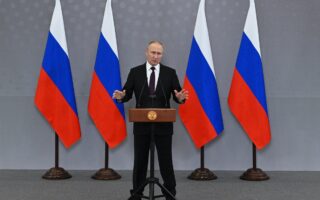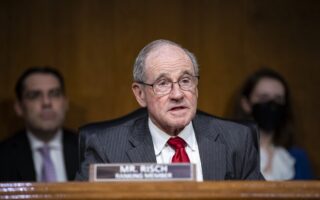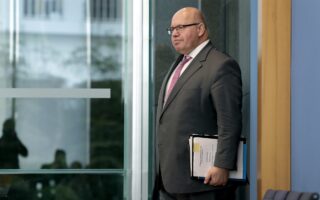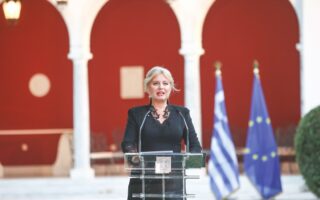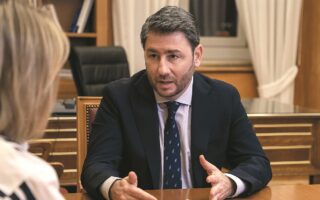Victory for Ukraine, accountability for Russia
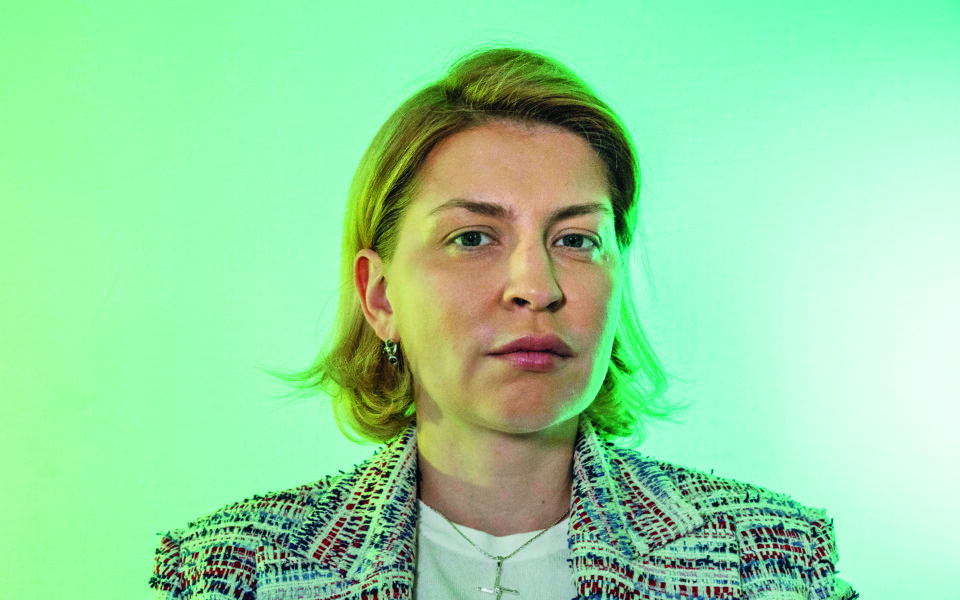
The Russian invasion of Ukraine made it clear that “we have to defend democracy and the European way of life on the battlefield,” Olha Stefanishyna tells Kathimerini. The deputy prime minister of Ukraine in charge of European and Euro-Atlantic integration, on the one-year anniversary of full-scale war, talks about the resolve of the Ukrainian people, the meaning of Joe Biden’s visit, Ukraine’s EU membership prospects and much besides.
We are speaking a day before the black anniversary of the full-scale invasion of Ukraine by Russia. A year on, how has Ukraine changed?
The life of all Ukrainians will never be the same again. But as a government, we remain fully functional and resilient, at the central and the local level. It was a very strong signal we wanted to send to the Ukrainian people. On top of that, the president of Ukraine has become a symbol of the resilience, the stamina of the Ukrainian people. He has kept us united and determined to keep fighting this past year. I also believe that this war, and the resolve of Ukraine, have changed the world. It is now clear that we have to defend democracy and the European way of life on the battlefield. The entire democratic world is united like it hasn’t been in a long time.
And how have you yourself changed?
My major decision was made on February 23 last year, when more than 100,000 [Russian] troops were massed on our borders with Belarus and Russia, and it was clear that the situation would escalate. At that point, I decided to separate from my children, to ensure their security. It was a very hard decision. But after I made it, I was exclusively a deputy prime minister who had to serve her country. It was like I gave myself carte blanche to do whatever was needed, 24/7. Now, a year later, I remain full of energy, there is no fatigue, personal or professional. That is my transformation: I don’t feel anything except black and white, and the desire to remain on the right side of history.
What was the meaning of Biden’s visit to Kyiv? What did you make of the contrasting speeches of President Biden and Vladimir Putin last week?
The speeches of the Russian president are of no interest to anyone in Ukraine. They are mostly targeted to a domestic audience, to the perpetuation of the lies, propaganda and repression on which the Russian leadership rests. The message of the Biden visit to Kyiv is that Ukraine is winning the war, restoring its territorial integrity and sovereignty, as well as the democratic balance and the security of Europe.
Has the West gotten the message on the need for faster decisions on military aid to Ukraine? Are you ready for the new Russian offensive that’s already under way?
Our military leadership and intelligence service are in constant contact with the military and intelligence services of the allies. Based on this exchange of information, President Zelenskyy speaks with the leaders [of Western countries] so as to achieve the speeding up and the scaling up of military aid. And his message has been heard: Some announcements were made after the recent Ramstein Group meeting, some – for example by Sweden and Belgium – after the president’s visit to Brussels. And then there is Germany, which not only decided to provide tanks but also to speed up their shipment. But we need even more, tanks and long-range artillery and combat jets, so as to reduce manpower losses, protect the civilian population and strengthen our defense capabilities on the battlefield.
Can China be an honest broker for peace? Are you concerned about the possibility of China offering lethal military aid to Russia, raised recently by the US secretary of state?
It is positive that a dialogue [with China] has begun, it was a line of communication that took a long time to establish, but it’s too soon to make any forecasts about its role. For our part, having all the Western democracies on our side, we have always sought the engagement of countries in Asia and Africa, so we can all contribute to ending the war, but also to prevent them from supporting Russia. So this line of communication is essential and could become a turning point for the creation of a wider coalition of states which are acting together to stop the war. On the question of possible military aid from China to Russia I am not ready to comment at this time.
The EU is on the verge of agreeing a 10th package of sanctions against Russia. Is it strong enough? Is enough being done to stop circumvention of sanctions?
Unfortunately, the war goes on and I’m sure there will be more sanctions packages. We didn’t expect that all our proposals would be adopted in this one. It is very important for us that it includes measures against Iran. We also took note of the fact that there are restrictive measures imposed on the middle management of Rosatom – though we expect these measures to be extended in future to the top management, and to other parts of the company. It is important that measures continue to be imposed on the circle of people close to the Kremlin, and also on individuals that fund or are involved in the conduct of the war.
On sanctions circumvention, after the recent EU-Ukraine summit we agreed to closer coordination between the mechanism being set up by the European Commission and our own Yermak-McFaul team on sanctions monitoring [the head of the office of Ukraine’s presidency and the former US ambassador to Moscow respectively].
How effective have sanctions been so far?
The cost for Russia is rising. It has lost the European market for its energy exports. Reorienting its exports – especially of gas – to other parts of the world is hard and costly. In addition, the sanctions are doing their work when it comes to Russian politicians, for example, governors of poor regions who are discovered to have villas in Great Britain or France. This is something that cannot be hidden. This creates the conditions for a transformation [of Russian society].
What can you tell us about the progress of Ukraine in meeting the criteria set by the European Commission for the start of accession negotiations? Are you optimistic that the ambitious target set by President Zelenskyy, for the opening of negotiations before the end of 2023, can be met?
Right now we have completed the necessary steps in the seven relevant areas (anti-corruption, rule of law, media, plus everything related to the rights and freedoms of people). Now we are awaiting the assessment of the European Commission and its further recommendations. In spring we will have the provisional report [of the Commission]. Based on that, anything that we have to do on our side will be done before the end of the year. We hope that this can create the necessary political momentum for the opening of negotiations.
What kind of coexistence do you envision with Russia after the end of the war? What would have to happen for relations to mend?
Ukraine, prior to 2014 and the annexation of Crimea and the start of the war in Donbas, had no issues with Russia. Nor, once the war is over and Ukraine’s territorial integrity is restored, will we have further claims on Russia. The crucial issue is what Russia will look like after the war. On our side, the necessary conditions [of any kind of normalization of relations] is the victory of Ukraine, the accountability of the political and military leadership of the Russian Federation for the atrocities and the war crimes – that is the minimum that will be required by Ukrainian society, the families of Ukraine. And the payment of reparations. Beyond that, irrespective of what happens in Russia, Ukraine will continue to build its defense capacity, so that no one gets an appetite for further aggression.
